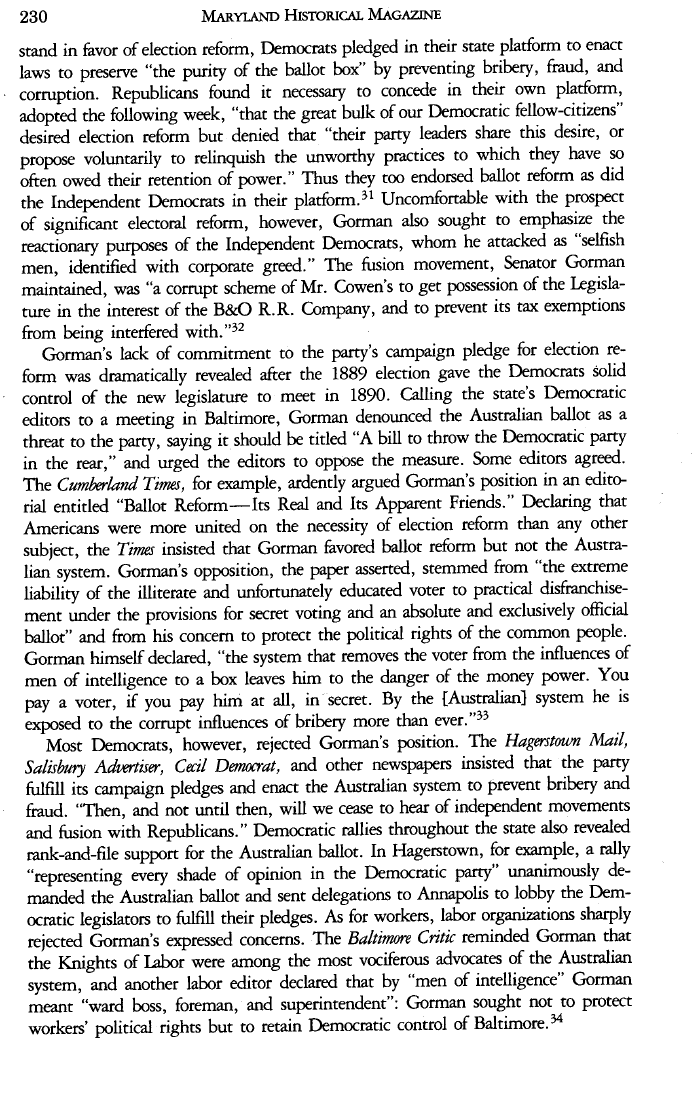|
230 MARYLAND HISTORICAL MAGAZINE
stand in favor of election reform, Democrats pledged in their state
platform to enact
laws to preserve "the purity of the ballot box" by preventing bribery,
fraud, and
corruption. Republicans found it necessary to concede in their own platform,
adopted the following week, "that the great bulk of our Democratic
fellow-citizens"
desired election reform but denied that "their party leaders share this
desire, or
propose voluntarily to relinquish the unworthy practices to which they have
so
often owed their retention of power." Thus they too endorsed ballot reform
as did
the Independent Democrats in their platform." Uncomfortable with the
prospect
of significant electoral reform, however, Gorman also sought to emphasize
the
reactionary purposes of the Independent Democrats, whom he attacked as
"selfish
men, identified with corporate greed." The fusion movement, Senator Gorman
maintained, was "a corrupt scheme of Mr. Cowen's to get possession of the
Legisla-
ture in the interest of the B&O R. R. Company, and to prevent its tax
exemptions
from being interfered with." 32
Gorman's lack of commitment to the parry's campaign pledge for election re-
form was dramatically revealed after the 1889 election gave the Democrats
solid
control of the new legislature to meet in 1890. Calling the state's
Democratic
editors to a meeting in Baltimore, Gorman denounced the Australian ballot
as a
threat to the party, saying it should be titled "A bill to throw the
Democratic party
in the rear," and urged the editors to oppose the measure. Some editors
agreed.
The Cumberland Times, for example, ardently argued Gorman's position in an
edito-
rial entitled "Ballot Reform-Its Real and Its Apparent Friends." Declaring
that
Americans were more united on the necessity of election reform than any
other
subject, the Timer insisted that Gorman favored ballot reform but not the
Austra-
lian system. Gorman's opposition, the paper asserted, stemmed from "the
extreme
liability of the illiterate and unfortunately educated voter to practical
disfranchise-
ment under the provisions for secret voting and an absolute and exclusively
official
ballot" and from his concern to protect the political rights of the common
people.
Gorman himself declared, "the system that removes the voter from the
influences of
men of intelligence to a box leaves him to the danger of the money power.
You
pay a voter, if you pay him at all, in secret. By the [Australian] system
he is
exposed to the corrupt influences of bribery more than ever. "33
Most Democrats, however, rejected Gorman's position. The Hagerrtoum Mail,
Salisbury Adzertirer, Cecil Democrat, and other newspapers insisted that
the party
fulfill its campaign pledges and enact the Australian system to prevent
bribery and
fraud. "Then, and not until then, will we cease to hear of independent
movements
and fusion with Republicans." Democratic rallies throughout the state also
revealed
rank-and-file support for the Australian ballot. In Hagerstown, for
example, a rally
"representing every shade of opinion in the Democratic party" unanimously
de-
manded the Australian ballot and sent delegations to Annapolis to lobby the
Dem-
ocratic legislators to fulfill their pledges. As for workers, labor
organizations sharply
rejected Gorman's expressed concerns. The Baltimore Critic reminded Gorman
that
the Knights of Labor were among the most vociferous advocates of the
Australian
system, and another labor editor declared that by "men of intelligence"
Gorman
meant "ward boss, foreman, and superintendent": Gorman sought not to protect
workers' political rights but to retain Democratic control of Baltimore.-"
|

